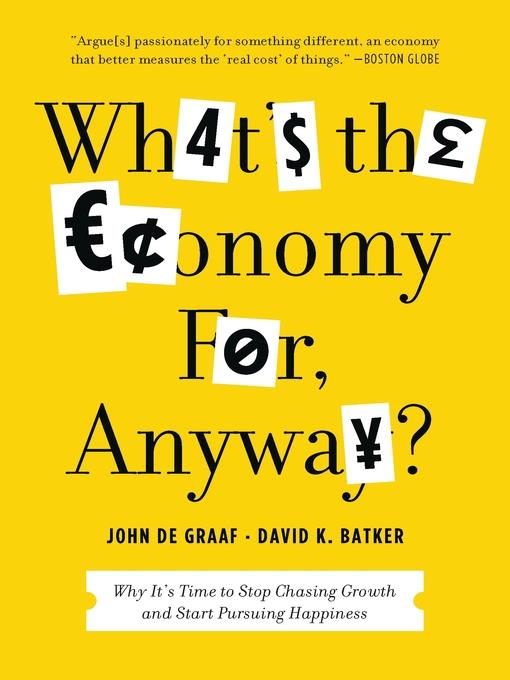
What's the Economy For, Anyway?
Why It's Time to Stop Chasing Growth and Start Pursuing Happiness
فرمت کتاب
ebook
تاریخ انتشار
2011
نویسنده
David K. Batkerناشر
Morphographicsناشر
Morphographicsشابک
9781608195145
کتاب های مرتبط
- اطلاعات
- نقد و بررسی
- دیدگاه کاربران
نقد و بررسی

September 12, 2011
Following their documentary of the same name, De Graaf (coauthor of Affluenza) and Batker, director of Earth Economics, a firm that provides ecological economic analysis, pose a provocative question: what is the economy for if not to maximize the well-being of the citizenry? Seen in this light, GDP becomes a woefully inadequate tool for assessing economic health. Using the claim of Gifford Pinchot, first chief of the Forest Service, that we should strive for “the greatest good for the greatest number over the longest run,” the authors argue that not only are we not on the right track, we’re hardly in the race. De Graaf and Batker draw upon various indices for measuring individual and collective satisfaction and security including Maslow’s Pyramid and the Chilean economist Manfred Max-Neef’s taxonomy of human needs. They make a strong case for looking toward Europe and pockets of economic sustainability within America, to take “bold action” to reorient our markets to serve human needs, to build a “solidarity economy... capitalism with a human face.” De Graaf and Batker’s criticisms—of big business, taxation, American universities, Obama’s response to the financial meltdown—are lucid; what comes as a pleasant surprise is that their solutions are no less clear and actionable.

September 1, 2011
A stimulating approach to the economy, which puts people and their needs ahead of money-based indicators of growth and performance.
De Graaf, coordinator of the Seattle Area Happiness Initiative (co-author: Affluenza: The All-Consuming Epidemic, 2005) and Batker, a fellow at the Gund Institute for Ecological Economics at the University of Vermont, examine new ways to think about economic processes, specifically as they relate to human happiness and well-being. The authors show that the indicators of performance developed during World War II—the "Gross National Product"—have become both obscurantist and counterproductive. They argue that human purposes and needs ought to provide the basis for much more broadly based measures of performance, which would consider what is the greatest good and benefit for the greatest number of people over the longest period of time. The authors have been involved with efforts to establish such approaches through the Seattle project and the Bhutan "Gross National Happiness Indicator," both of which are based on measuring the satisfaction of human needs, like food, shelter, clothing, health care, education and those related to the quality of individual and community life. De Graaf and Batker compare these approaches with legislative and social initiatives in countries like the Netherlands, Denmark and Germany, where such approaches are made priorities. For example, since 1981 in Holland, it has been a requirement that part-time workers be treated exactly the same as full-time workers. The authors counter the insistence of U.S. conservatives that the redistribution of wealth merely shifts money from rich to poor; they demonstrate that society's resources as a whole are increased through added capabilities that enrich everyone's lives.
An entertaining presentation of important ideas and information about how lives could be improved.
(COPYRIGHT (2011) KIRKUS REVIEWS/NIELSEN BUSINESS MEDIA, INC. ALL RIGHTS RESERVED.)

























دیدگاه کاربران